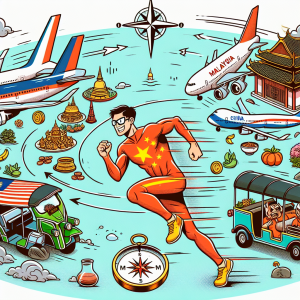As concerns over the ongoing trade tensions escalate, the US dollar has taken a significant hit, reflecting fears of a looming recession and the lingering effects of the Trump-era tariffs. The impact of these tariffs continues to reverberate through global markets, including Singapore, a nation that thrives on trade and economic stability.
The market’s response to the recent economic indicators has been stark. The US dollar plunged against several major currencies, signaling investor anxiety as the Federal Reserve grapples with inflation and interest rate adjustments. This downturn has been exacerbated by fears that the trade war initiated during Donald Trump’s presidency is far from over. The tariffs imposed on a wide range of imported goods have not only strained US-China relations but have also created ripple effects that affect economies worldwide, particularly those like Singapore that are heavily reliant on trade.
In Singapore, the ramifications of these trade tensions are acutely felt. The city-state, known for its strategic location and robust infrastructure, has built its economic success on free trade principles. With a AAA sovereign credit rating and a reputation as a tax haven, Singapore attracts substantial foreign investment, making it vulnerable to shifts in global trade dynamics. The government, which contributes about 22% of GDP, plays a crucial role in mitigating these impacts through proactive economic policies and diversification strategies.
Economic Diversification and Resilience
Singapore’s economy is notably diverse, with key sectors including financial services, manufacturing, and oil refining. The nation is also a global logistics hub, with the Port of Singapore and Changi Airport ranking among the busiest in the world. However, the uncertainty surrounding US tariffs has raised questions about the future of these industries. The semiconductor market, in which Singapore is a leading player, faces challenges as companies reassess their supply chains in response to changing trade policies.
The ongoing trade war not only threatens economic stability but also challenges Singapore’s diplomatic relationships. As a founding member of ASEAN, Singapore has a vested interest in fostering regional stability and economic cooperation. The nation’s strategic position was highlighted during the historic summit between Donald Trump and North Korean leader Kim Jong-un in 2018, showcasing its role as a mediator in international relations.
Conclusion
As the US dollar continues to struggle amid trade war fears, Singapore must navigate a complex landscape shaped by both economic and political factors. The city-state’s ability to adapt to these challenges while maintaining its status as a global financial hub will be crucial in the coming months. With a commitment to economic resilience and strategic international engagement, Singapore aims to weather the storm brought on by the ongoing repercussions of the Trump tariffs and the uncertain global economic climate.





